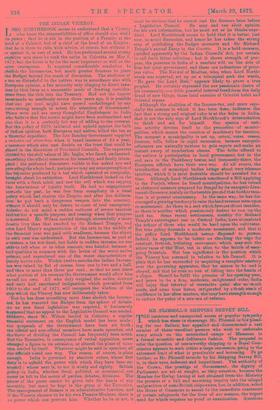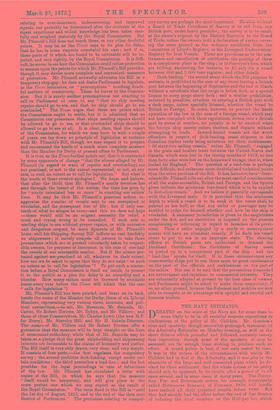iptimsoLL's SHIPPING SUHVgYAIILL.
rilElErimutenseantdortexpected, access ef rpopular' sympathy
1. which:hats giseirto eneettrage -Mr. 'hie plead- ing -for cur Sailors) has' appalled- and disoondortedf a vast number of therm texcelleut persons who 'wish, undertake every attack the entrenched -camps- of Mammon in formal-scientific ,cletiberate fashion. .The 'proposal- to refer the question of untseavrorthy-shipping to a-Royal -Com- mission 'appears 'to -such critics a:large-coneeseion,:geing to the ettremeat limit of what is practicable and beeoraiag. Pe go further, as Mr. -Plimsoll-intends- -by his Shipping Survey Bill, IL in theireyes, indecent-rind impeftinent. Tian authority of the Crown, 'the-prestige of Government,- the'dignity of Parliament are set -at naught, as they moneeive, because the Member for-Derby; having M latft obtained from-the-Ministry the promise of a fill end 'searching inquiry into the- 'alleged malpractices of some British shipowners,has; in addition, -asked the House of Commons to assent to the immediate enactment of certain safeguards for the lives of our seamen,- the 'argent need for which-requires no proof or examination. Questions relating to over-insurance, undermanning, and improved ' signals, can probably be determined after the evidence of the ripest experience and widest knowledge has been taken -care- fully and weighed maturely by the Royal Commission. But Mr. Plimsoll's Bill does not touch these, or any other doubtful points. It may be, as the Times says in its plea for delay, that he has in some respects overstated his case ; and if so, those parts of it which are found to be untenable will be re- jected, and very rightly, by the Royal Commission. It is diffi- cult, however, to see how.the Commission could refuse protection to seamen upon the points for which Mr. Plimsoll's Bill provides, though it may devise more complete and convenient measures of protection. Mr. Plimsoll avowedly advocates his Bill as a temporary stop-gap; he does not desire Parliament to legislate, as the Times insinuates, on "presumptions" touching doubt- ful matters of controversy. These he leaves to the Commis- sion. But it is surely neither presumptuous nor exacting to call on Parliament at once to say "that no ship needing repairs should go to sea, and that no ship should go to sea overloaded." The Times urges that these are points which the Commission ought to settle, but it is admitted that no Commission- can pronounce that ships needing repairs should be allowed to go to sea, or that overloaded ships should be allowed to go-to-sea at all. It is clear, then, that the report of the Commission, for which we may have to wait a couple - of yen" can lay down no principle of legislation at variance with Mr. Plimsoll's Bill, though we may expect it to prepare and recommend the heads of a much more complete measure than the Member for Derby at present offers to Parliament.
It is true, as the Times further points out, that it is contended by some opponents of change "that the abuses alleged by Mr. Plimsoll (in regard to 'want of repairs and overloading) are not practised, or not to the extent represented, or not, at any rate, to such an extent as to call for legislation." But what is the worth of these evasive apologies ? We hope, and believe, that after the thrill that Mr. Plimsoll's manly devotion has sent through the breast of the nation, the time has gone by for " nicely calculated less or more" in counting our sailors' lives, It may be.' that Mr. Plimsoll's generous ardour ex- aggerates the number .of vessels sent to sea unrepaired or overladen, and the consequent loss of life ; but if only one- tentlatof what.he alleges be true—and this we dare not hope —there would still be an exigent necessity, for relief, a cruel and crying -wrong to be remedied. If such acts as sending ships to sea without proper repairs, or with excessive and dangerous ,cargoes, be mere figments of Mr. Plimsoll's brain,- still his Shipping .Survey Bill inflicts .no -real hardship on- shipowners ; it merely compels :all owners to take those . precautions .which.are.at present voluntarily taken by respect- able-owners, for purposes of insurance, in the case of one-half the vessels of-our mercantile marine. But if the abuses pro- tested. against are-praetised at all, whatever be their extent, how can me be asked to agree that they do not exist "to such an extent as to call for legislation "9 To put such a conten- tion before a Royal Commission is itself an insult, to present it to the public- as a plea for delay is an absurdity and a blunder.- HO PI many sailors must be drowned by avoidable lossesevery year .before the Times will admit that the case "calls for legislation"?
Mr. Plimsoll's Bill has been printed, and bears on its back, beside the name-of the Member for Derby, those of six Liberal Members,. representing very various views, ,interests, and poli- tical eonnections,-e-to wit, Mr. foreman, Mr. Sanauda, Mr. Carter, Sit Robert Torrens, Mr. Eykyn, and Mr. Villiers ; and those-of three .Conaervatives, Mr. Charles Lewis (the new M.P. for Derry), Mr. .Staveley Hill, and Sir H. Selwin-Ibbetson. The I naraestof Mr. Villiers and Sir Robert Torrene offer a guarantee-that the measure will be kept straight on the lines of economical,orthodoxy, while that of Mr. &etude may he taken as a pledge. that the great shipbuilding and shipowning interests are favourable to the claims of humanity and justice. The-Bill itself is /very-ably drawn, very clear, and very simple. It consistsnf four parts,—the first regulates the compulsory survey ; the-second prohibits deck-loading, except under cer- tain conditions ; the,third prescribes a load-line ; and the last provides . for the legal proceedings in case of infractions of the law. Mr. Plimsoll has circulated a letter with copies ,of ..the .Bill, in which he says that the measure "itself .would 'be temporary, and will give place to the more. perfect one -which we may expect as the result of the Royal Octramission." The -term fixed in the Bill is "until the 1st day of August, 1875, and to the end of the then next Session of Parliament." The provisions relating to compul-
sory survey are perhaps the most important. No ship without a Board of Trade Certificate of Survey is to sail from any British port, under heavy penalties; the survey is to be made, at the owner's request, by the District Surveyor to the Board of Trade, unless the owners hold a declaration of survey, cover- ing the same ground as the ordinary certificate, from the Committee of Lloyd's Register, or the Liverpool Underwriters' Registry for Iron Vessels. There are provisions as to the con- tinuance and cancellation of certificates, the posting of them in a conspicuous place in the ship ; as to Surveyor's fees, which are trifling, amounting, for instance, to £5 only for a vessel between 600 and 1,000 tons register ; and other details.
"Deck-loading," the second abuse which the Bill proposes to restrain, is prohibited in the case of any vessel leaving .a British port between the beginning of September and the end of Merch without a certificate that the cargo is below deck, or a special licence to carry cargo above deck ; and a similar prohibition, enforced by penalties, attaches to entering a British port with a deck cargo, unless specially licensed, whether the vessel be British or Foreign. In order, however, to prevent the ,harsh operation of the law in the ease of a foreign vessel, which may not have complied with these regulations, driven into a British port by stress of weather, no penalty is to be exacted when the foreign ship merely enters, shelters, and departs without attempting to trade. Inward-bound vessels are the worst offenders in respect of deck-loading, some shippers in the Canadian timber trade being notorious for their reckleesuess. "Of sixty-two sailing vessels," writes Mr. Plimsoll, "engaged in the grain and lumber trade between the United States and Canada, which were lost in the closing mouths of 1872, no less than forty-nine were lost on the homeward voyage, that is when loaded for England." The question of a load-line is perhaps more difficult, and embraces more doubtful and technical points than the other portions of the Bill. It has, however, been "deter- mined (Mr. Plimsoll tells us), after the most careful consideration of all the scales accessible, British and Foreign, and the figures given indicate the minimum free-board which is to be -applied to first-class-vessels." And we believe A generally corresponds with the Liverpool scale. It is provided that the minimum depth to which a vessel is to be sunk in the water shall be painted on her hull, so that any sailor or passenger may be enabled to judge for himself whether and how far the ship is overladen. A summary jurisdiction is given to the-magistrates under the Act, and no restriction is imposed on the peweous complaining or informing in regard to breaches of its provi- sions. Thus a sailor engaged by a needy or un'scrupuloue master will have an abundant remedy, if he finds his. vessel about to put to sea in an improper state. The clearing officers at British ports are authorised to demand the Deckload Certificate ; the Certificate of Survey net be posted up in a conspicuous part of the ship ; and the " load-line " speaks for itself. If in these circumstanees any unseaworthy ships put to sea, there must be great carelessness on the part of the officials and recklessness on the part-of the sailors. Nor can it be said that the precautions demanded are extravagant and injurious to commercial interests. They are voluntarily adopted at present by the beat class of owners, and Parliament might be asked to make them compulsory, if on no other ground, because the dishonest and reckless are-now able to compete at an advantage with upright and careful anti. humane traders.







































 Previous page
Previous page